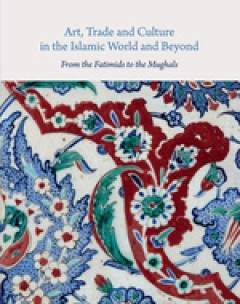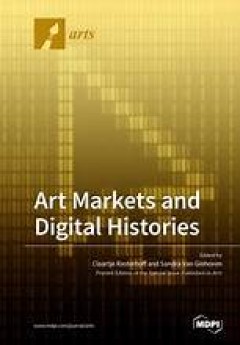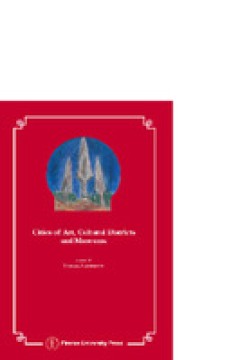Filter by

Art Trade and Culture
The essays in this book trace a rich continuum of artistic exchange that occurred between successive Islamic dynasties from the twelfth through nineteenth centuries—as well as the influence of Islamic art during that time on cultures as far away as China, Armenia, India, and Europe. Taking advantage of recent technologies that allow new ways of peering into the pasts of art objects, the autho…
- Edition
- -
- ISBN/ISSN
- 9781914983238
- Collation
- oer.unej.ac.id
- Series Title
- -
- Call Number
- -

Art Outside the Lines
This collection of essays, written by leading scholars in the fields of East German art, film, literature, music, and museum studies, seeks to renegotiate the artistic legacy of the German Democratic Republic. Combining a range of theoretical and practical perspectives, the volume challenges the narrow frameworks of totalitarianism and Ostalgie that have dominated discussions of art produced in…
- Edition
- -
- ISBN/ISSN
- 9789042033412
- Collation
- oer.unej.ac.id
- Series Title
- German Monitor,
- Call Number
- -

Art of Fugue
Fugue for J. S. Bach was a natural language; he wrote fugues in organ toccatas and voluntaries, in masses and motets, in orchestral and chamber music, and even in his sonatas for violin solo. The more intimate fugues he wrote for keyboard are among the greatest, most infl uential, and best-loved works in all of Western music. They have long been the foundation of the keyboard repertory, played …
- Edition
- -
- ISBN/ISSN
- 9780520962590
- Collation
- oer.unej.ac.id
- Series Title
- -
- Call Number
- -

Art Markets and Digital Histories
This Special Issue of Arts investigates the use of digital methods in the study of art markets and their histories. As historical and contemporary data is rapidly becoming more available, and digital technologies are becoming integral to research in the humanities and social sciences, we sought to bring together contributions that reflect on the different strategies that art market scholars emp…
- Edition
- -
- ISBN/ISSN
- 9783039219711
- Collation
- oer.unej.ac.id
- Series Title
- -
- Call Number
- -

Art in the Global Present
Art in the Global Present presents a fascinating collection of essays that together reveal how art is currently navigating a globalised world. It addresses social issues such as the impact of migration, the ‘war on terror’ and the global financial crisis, and questions the transformations produced by new forms of flexible labour and the digital revolution. Through examining the resistance t…
- Edition
- -
- ISBN/ISSN
- -
- Collation
- oer.unej.ac.id
- Series Title
- -
- Call Number
- -

Art in the Anthropocene: Encounters Among Aesthetics, Politics, Environments …
Taking as its premise that the proposed geologic epoch of the Anthropocene is necessarily an aesthetic event, this book explores the relationship between contemporary art and knowledge production in an era of ecological crisis, with contributions from artists, curators, theorists and activists. Contributors include Amy Balkin, Ursula Biemann, Amanda Boetzkes, Lindsay Bremner, Joshua Clover & Ju…
- Edition
- -
- ISBN/ISSN
- 9781785420177
- Collation
- oer.unej.ac.id
- Series Title
- Critical Climate Change,
- Call Number
- -

Art in Progress
In this challenging and erudite philosophical essay, the author argues that in art, belief in progress is still relevant, if not essential. The radical freedoms of postmodernism have had a crippling effect on art - more than ever before, art is in danger of becoming meaningless. Art can only acquire meaning through context, and the concept of progress is ideal as the primary criterion for estab…
- Edition
- -
- ISBN/ISSN
- 9789053565858
- Collation
- oer.unej.ac.id
- Series Title
- -
- Call Number
- -

Art Crossing Borders
Art Crossing Borders offers a thought-provoking analysis of the internationalisation of the art market during the long nineteenth century. Twelve experts, dealing with a wide variety of geographical, temporal, and commercial contexts, explore how the gradual integration of art markets structurally depended on the simultaneous rise of nationalist modes of thinking, in unexpected and ambiguous wa…
- Edition
- -
- ISBN/ISSN
- 978-90-04-29199-7
- Collation
- oer.unej.ac.id
- Series Title
- Studies in the History of Collecting & Art Markets, Volume: 6
- Call Number
- -

Art Cities, Cultural Districts and Museums
The subject of economic valorisation has become a current topic and the idea that culture can be considered a factor of economic production, able to generate wealth, appears to have been generally accepted. The book consists of a series of essays about the economic valorisation of the cultural, artistic and environmental heritage of the art city of Florence using a business economics approach a…
- Edition
- -
- ISBN/ISSN
- 888453125X
- Collation
- oer.unej.ac.id
- Series Title
- -
- Call Number
- -

Art and Research – Contemporary Challenges
In the artistic / vocational academic education field, a phrase like “scientific research” generates several controversies; however, they can be the roots of interdisciplinary approaches, through which to build bridges between concern and research. The conference “Art and Research - contemporary challenges” aims, also through the published volume, to disseminate the results of research …
- Edition
- -
- ISBN/ISSN
- 9788366675193
- Collation
- oer.unej.ac.id
- Series Title
- -
- Call Number
- -
 Computer Science, Information & General Works
Computer Science, Information & General Works  Philosophy & Psychology
Philosophy & Psychology  Religion
Religion  Social Sciences
Social Sciences  Language
Language  Pure Science
Pure Science  Applied Sciences
Applied Sciences  Art & Recreation
Art & Recreation  Literature
Literature  History & Geography
History & Geography